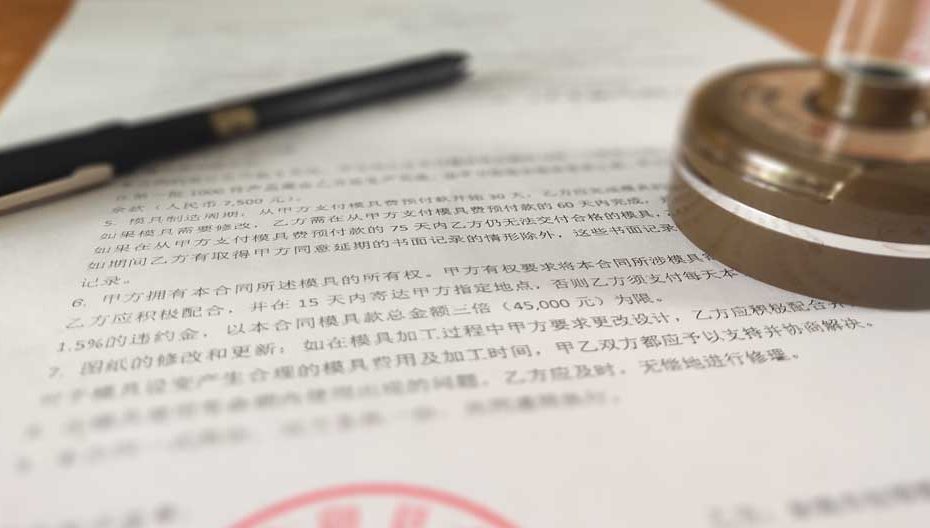As a sourcing company for custom parts and molds, we constantly sign manufacturing contracts (or supply agreement) with factories, especially when we start to use a new factory.
In this post I am going to introduce how we deal with manufacturing contracts from a purchaser’s perspective, and what should be included. Since we are not legal experts so I will not go too deep into the juristic analysis, but focus more on the practical operation we adopt in our work.
Why do we need to sign contracts with factories?
A contract will cover the most important details, terms that we have discussed and agreed upon with the factory, and put them in writing so they will be kept fresh on paper for quite a long period of time. This can help to avoid many possible disagreements or disputes with the factory.
This is certainly not just a memorandum, it has much stronger enforcing power.
Is signing contracts a common practice in China?
Yes, but most of the contracts use general contract templates and do not cover details. Many factories like this kind of contracts so there are not too much responsibilities or constraints.
If we ask the factory to sign a contract with a lot of details and constraints, does it make them feel intimidated or less friendly?
Probably, but most of them will accept it if they want your orders. You already discussed and agreed on the terms and details, why does it matter to put them on the contract?
At the same time, we also try to keep the most important details, terms and delete some that are less important. This will help to make the negotiation easier. It all depends on whether you are an important customer to the factory, the more important you are, the more demands you can put into the contract.
What should be included in the contract?
Quality requirements
The quality requirements and specifications need to be clearly defined. This will usually include dimensions, materials, surface coating, heat treatment and more.
Customized inspection methods (if there is any) shall also be in defined to ensure proper functioning of the products.
Drawings or quality documents can be used as the appendix to form an integral part of the contract.
The sealed samples can also be used as the inspection criteria. These samples are made by the factory and approved by the customer prior to mass production.
Order delivery date
We may define a liquidated damages for delays. Sometimes a order termination clause can also be added if the delay is too long.
Mold / tooling ownership
If some molds, fixtures and tooling are needed for the production of your products, then it is necessary to define the ownership of the molds.
Many customers presumably believe that they should rightfully own the molds since the molds or tooling are made at their expenses, and have the right to take it back or transfer to another supplier, but it is not always the case. This has to be clearly defined in the contract.
Include a liquidated damage in this provision will help to avoid intentional delay of mold transfer from the manufacturers.
IP protection
We will sign a confidentiality agreement (or NDA, NNN agreement) with the manufacturer or include such clauses in the manufacturing contract when the customer have such a concern.
In my observation, many Chinese factories will respect the confidentiality clauses to some extent,
but if your product or idea is really brilliant, you need to consider the worst case scenario and take further preventive measures.
Packaging and shipment
This will often be ignored but the manufacturer is responsible for proper packaging of goods, the freight companies will not take responsibility for damages caused by poor packaging.
Are contracts enforceable in China?
You may not get the perfect protection as you expect with the contracts but they are certainly useful!
First of all, it is more important to choose the right manufacturer than defending your interests on court. Luckily we have not entered into the court against our suppliers. We should all focus on building our business than fighting a law suit, isn’t it? The contract serves more as a gentlemen’s agreement that to ensure smooth order completion.
At the same time I have seen and heard of many examples of successful contract enforcement. However, the process could be tiresome and time consuming. This is the last defending fence to protect our bottom line.
Our involvement on order completion is still necessary
Even with the contract on hand, it does not mean we can be totally relaxed. We need to be extensively involved in the manufacturing processes and quality inspection. So even the products arrived with imperfections, that would be minor and at a very low percentage, the factories are still willing to compensate. If the losses are too great for the factory to take, then they would probably rather meet us in the court room. Anyway, choosing the right factory and our proper involvement in production are what really matter.
